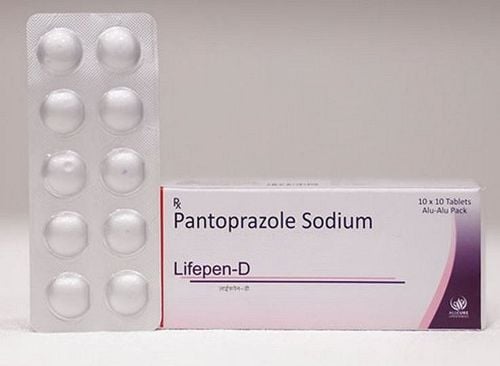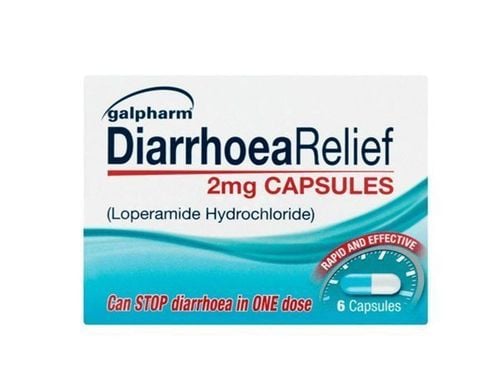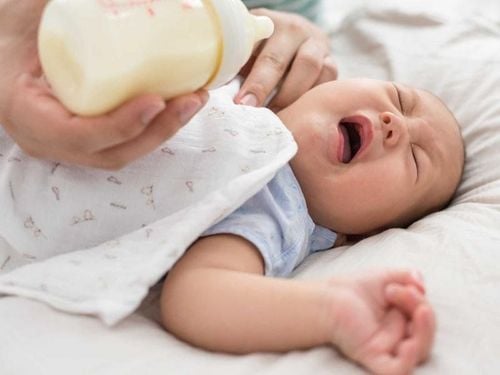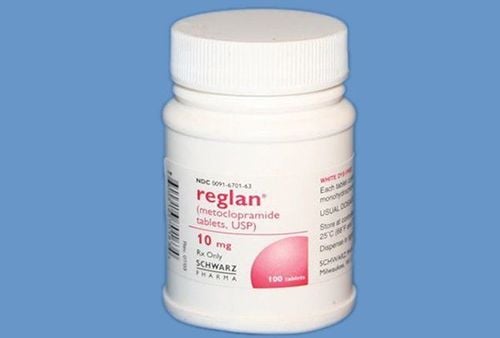This is an automatically translated article.
The article is professionally consulted by Master, Doctor Ngo Thi Oanh - Pediatrician - Pediatrics - Neonatology - Vinmec Ha Long International General Hospital.Vomiting after eating, belching is a common phenomenon in children, especially infants, but most of them will go away on their own after the baby is 1 year old. If this condition goes on longer, accompanied by other symptoms and complications, parents need to pay attention to prevent gastroesophageal reflux.
1. Why are young children prone to gastroesophageal reflux?
According to health experts, up to two-thirds of young children have vomiting and belching in the first months of life, most of which will clear up on their own by the time they are 1 year old. Only a small number of children will continue to progress longer and present with serious complications. There are many reasons why young children are prone to gastroesophageal reflux, but mainly because the stomach and other organs are not fully developed and stable.Normally, when a baby suckles, milk will pass through the mouth, down the esophagus, through the cardia and then into the stomach. In the cardia, there is the lower esophageal sphincter that acts as a one-way valve to prevent reflux from the stomach into the esophagus. In infants, the valvular muscles of the heart are weak and spongy. If the baby's sucking position is not correct, it will cause the air in the stomach to rise with some milk, through the cardia and back up into the esophagus and out. Between the stomach and intestines there is also a valve with a similar function called the pylorus. Cardiac muscle in children is very weak, but the pylorus muscle is very developed, so in young children, food is easy to stagnate in the stomach for a long time, creating more favorable conditions for gastroesophageal reflux in infants. birth appeared.
Another factor that is also quite common is that in infants, the stomach is horizontal, the angle between the stomach and the esophagus is obtuse angle, so the baby is also more prone to reflux. In addition, if during feeding, the baby swallows air and then is placed horizontally or tilted to the right, the baby is also prone to spitting up. It can be seen that vomiting after eating, belching is very common, especially in the first months of children. However, besides regurgitation, physiological reflux, there are cases of young children with gastroesophageal reflux disease or other causes such as enteritis, infection, cow's milk protein allergy, ..
.

Tư thế bú cũng khiến trẻ có thể bị nôn trớ ợ hơi
2. Recognize regurgitation, physiological and pathological regurgitation
If the phenomenon of infant vomiting after eating, after belching occurs in a short time, with little frequency and without causing any symptoms, it is called physiological reflux.Pathological gastroesophageal reflux disease occurs more often, lasts longer and can cause clinical symptoms with different degrees.
If the child is under 6 months old, spits up several times a day but still plays, gains weight well, sucks regularly, doesn't wheeze again and again... then it's most likely just physiological reflux. This regurgitation will subside over time.
If the child still spits milk after 1 year old or the child is slow to gain weight, anorexia, thin, afraid to eat, or has prolonged wheezing, poor response to treatment, recurrent pneumonia... then many It is possible that this is pathological reflux. At that time, parents need to take the child to the doctor for timely diagnosis and treatment.
As a key area of Vinmec Health System, Pediatrics Department always brings satisfaction to customers and is highly appreciated by industry experts with:
Gathering a team of leading pediatricians: including leading experts with high professional qualifications (professors, associate professors, doctorates, masters), experienced, worked at major hospitals such as Bach Mai, 108.. Doctors All are well-trained, professional, with a mind - range, understanding young psychology. Besides domestic pediatricians, the Department of Pediatrics also has the participation of foreign experts (Japan, Singapore, Australia, USA) who are always pioneers in applying the latest and most effective treatment regimens. . Comprehensive services: In the field of Pediatrics, Vinmec provides a series of continuous medical examination and treatment services from Newborn to Pediatric and Vaccine, ... according to international standards to help parents take care of their baby's health from birth to children. from birth to adulthood Specialized techniques: Vinmec has successfully deployed many specialized techniques to make the treatment of difficult diseases in pediatrics more effective: neurosurgery - craniofacial surgery, stem cell transplantation. blood in cancer treatment. Professional care: In addition to understanding children's psychology, Vinmec also pays special attention to the children's play space, helping them to play comfortably and get used to the hospital environment, cooperate in treatment, improve the efficiency of medical treatment.
Please dial HOTLINE for more information or register for an appointment HERE. Download MyVinmec app to make appointments faster and to manage your bookings easily.
3. How to take care of children with vomiting after eating, belching
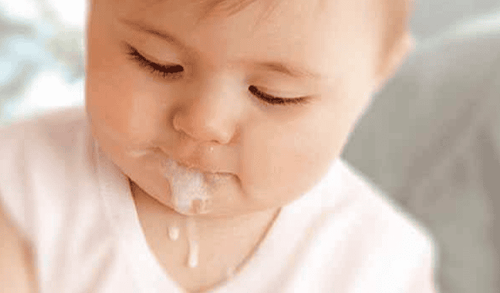
Cẩn thận với trào ngược dạ dày bệnh lý ở trẻ trên 1 tuổi
For breastfed babies, the baby should be fed on the left breast first, when the amount of milk in the baby's stomach is still small, it is possible to lie on the right side. Then, switch the baby to the right side when the baby's stomach is full of milk, lying on the left side. Thus, milk will easily enter the stomach and limit causing gastroesophageal reflux.
With bottle-fed babies Do not let the bottle lie on its side, make sure the nipple is always full of milk. When finished feeding, hold the baby's head high for 15-20 minutes, pat the baby's back to help burp, then lay on the left side and prop the pillow slightly high. The baby should not be breastfed immediately, it will easily choke, spit up milk, and should not lift the baby up and down after feeding.
In addition, when breastfeeding, do not let the baby cry because it will cause the baby to swallow a lot of air, causing stomach distension and easy vomiting. The minimum time between feedings is 2 hours, the maximum is 4-5 hours.
Do not force children to eat, drink too much, divide food into many small meals during the day to both ensure the necessary amount of food and not cause bloating and discomfort.
If the child's vomiting and belching is severe and does not improve after adjusting the diet and feeding position, parents can refer to the use of medication. Use the medicine only with the advice of a medical professional.
Thus, vomiting after eating, belching in babies and children under 1 year old is quite normal, parents apply the above methods to limit this situation. In addition, it is also important to pay attention to monitor symptoms to prevent pathological gastroesophageal reflux disease in children.





